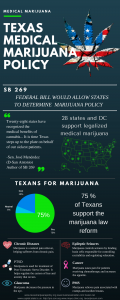Joint meeting at Texas Legislature

Feb 8, Texas Sen. Jose Menéndez (D- San Antonio), sponsor of Senate Bill 269, addressed Texas Legislature to expand the use of medical marijuana for those who qualify. If passed, the bill will expand on Senate Bill 339 to allow individuals who have debilitating and chronic medical conditions to receive cannabis as recommended by their doctors.
Senate Bill 339, also known as Texas Compassionate Use Act, signed by Gov. Gregg Abbott in 2015, was passed to assist individuals who were suffering from medical conditions such as epilepsy. Under SB 339 patients were allowed to obtain Cannabidiol oil, which is a non-psychoactive drug that contains Tetrahydrocannabinol in low amounts. SB 269 would expand that usage to include patients suffering from Post-traumatic Stress Disorder (PTSD), cancer, autism, HIV, severe pain, nausea and Parkinson’s are just a few of the illnesses that can be treated with cannabis.
SB 269 does not specify the amount of cannabis that can be distributed to patients and calls into question who should be authorized to determine the prescribed amount.
“Doctors, not politicians, should be determining what is best for Texas patients,” Menendez is quoted as saying in a Dec 6 2016 article published in The Dallas Morning News. “This is legitimate medicine that can help a variety people, from the grandmother suffering from cancer to the veteran coping with PTSD after returning home from war.”
Cara Bonin, executive director of Houston Norml, a non-profit organization dedicated to informing individuals about marijuana and bringing about change in the United States said, SB 269 will be helpful for the residents of Texas and pointed out that a number of states have already “moved forward” and considers medical marijuana a positive contribution for patients.
“I think that it will be extremely beneficial because it will allow patients who suffer from debilitating conditions to access cannabis without having to leave the state,” Bonin said. “And there are already 27 states that already have recognized the benefits of medical marijuana, and Texas should be included in that list.”
One of Menendez’ arguments for the bill’s passage is over concerns that Texas residents have to become “medical refugees” in order to receive cannabis to treat their conditions.
“If that’s what they’ve come to find that works for them, they should be able to live in their state and be able to have access to the medicine that their doctor feels is best for them,” Menendez was also quoted as saying in The Dallas Morning News article.
The 2017 Texas legislative session began Jan. 10, and the outcome will determine how patients will receive medical cannabis in the state of Texas.
“The plan includes opening testing facilities that will test the quality and purity of the cannabis or send it out to get tested,” Bonin said.
Romana Harding, deputy director of Houston Norml, expressed how controlled cannabis doses has helped with her chronic pain as compared to pharmaceutical drugs.
“I am a veteran with complex PTSD from surviving 4 years of military sexual trauma,” Harding said. “I was very suicidal until I began using medical cannabis. The VA would have me taking a handful of pharmaceuticals for my shattered wrist, jaw and ankle that could kill me and have toxic effects on my organs as well. The psychotropics are also addictive and toxic. Instead of those, I micro-dose with cannabis. But I did not give up a chunk of my sanity fighting for our nation to be made a criminal for using a medication my doctor’s want me to be able to use. Medicine should not depend on my zip code.”
Although SB 269 is being cheered by some for the positive impact this could have for patients, the bill has also met with opposition from others including organizations against marijuana in Texas.
The American Academy of Pediatrics (AAP), an organization representing doctors who treat children and adolescents are opposed to the possible effects that medical marijuana or the legalization of marijuana may have on young people stating that marijuana is listed as a schedule I drug and still not approved by the U.S. Food and Drug Administration.
“The AAP opposes ‘medical marijuana’ outside the regulatory process of the U.S. Food and Drug Administration,” states the organization in its latest policy statement.
Carla Lowe is the director of Citizens Against Legalizing Marijuana (CALM), a committee that represents a position based on the use, cultivation or transportation of marijuana and firmly believes that marijuana laws should be enforced instead of relaxed.
“Under Federal law there is no such thing as medical marijuana, and it does not sound safe for our kids, community or environment,” Lowe said. “Doctors can only recommend it, but not prescribe it, because it’s a schedule I drug.”
Newly appointed Attorney General Jeff Sessions has been in opposition of marijuana reform and will now have the opportunity to define the position of the federal government on marijuana.
“We need grown ups in Washington to say marijuana is not the kind of thing that ought to be legalized, it ought not to be minimized, that it is in fact a very real danger,” Sessions is quoted as saying in a Feb 8 2017 article published in Business Insider.


So, thinking that CALM was a Texas organization Houston NORML needed to educate, I looked into CALM and found out they’re only in California and Ohio. Look here under the tab “find your CALM”: https://calmusa.org/calmoh/
Why use them if they do not pertain to Texas?
“Under Federal law there is no such thing as medical marijuana”
Actually, there is and it’s sad a rep for CALM doesn’t know this because it is vital information.
The federal government has a medical patent on cannabis. Look here: http://cannabisinternational.org/info/cbd-patent.pdf